Workshops for primary schools
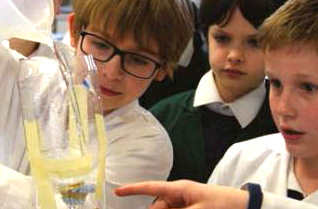 See Science offer a range of half day and full day bespoke workshops for primary pupils.
See Science offer a range of half day and full day bespoke workshops for primary pupils.
The workshops are designed to provide primary pupils with a series of challenges. The activities have been designed so that they can also be used as transition day activities.
The challenges are designed to facilitate learning, team working and encourage pupils' curiosity to find out how and why things work. During each challenge pupils will develop their problem solving, communication and innovation skills.
Primary pupils who complete the additional extension activities can also register for a Discovery CREST Award.
For more information regarding the cost of providing workshops and availability please contact enquiries@see-science.co.uk. All materials and resources are provided.
The Electricity Challenge
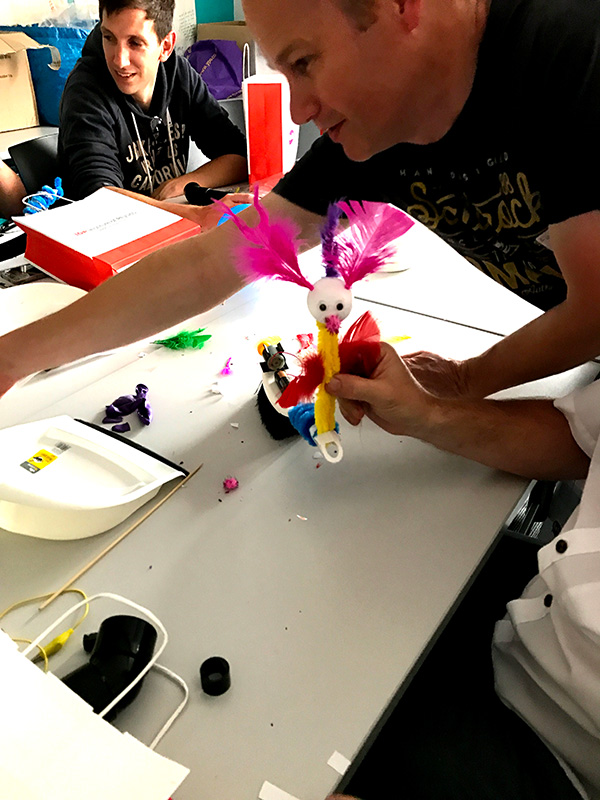 Through this activity, pupils will investigate the uses of electricity and its control in simple circuits, investigate flow of electricity, and recognise that forces can affect movement and measure speed. The pupils will construct an electric powered Alien. The groups test their Alien and re ne their designs so that it travels quickly over the track. The activity allows the pupils to develop their teamwork and communication skills.
Through this activity, pupils will investigate the uses of electricity and its control in simple circuits, investigate flow of electricity, and recognise that forces can affect movement and measure speed. The pupils will construct an electric powered Alien. The groups test their Alien and re ne their designs so that it travels quickly over the track. The activity allows the pupils to develop their teamwork and communication skills.
The Marble Roller Coaster Challenge
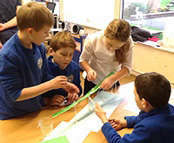 This activity will help pupils to learn how friction and gravity affects objects in motion. The pupils will build a marble run and experiment where to place bends and slopes in their roller coaster to meet the challenge. The activity allows them to develop their teamwork and communication skills by designing the slowest marble run.
This activity will help pupils to learn how friction and gravity affects objects in motion. The pupils will build a marble run and experiment where to place bends and slopes in their roller coaster to meet the challenge. The activity allows them to develop their teamwork and communication skills by designing the slowest marble run.
The Squashed Tomato Challenge
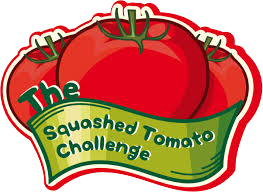 The Squashed Tomato Challenge is a STEM Challenge designed by Practical Action where pupils design and build a model to move tomatoes down a mountain. In Nepal many farmers living on the mountainside grow fruit and vegetables, including tomatoes. To earn a living they need to sell these at the local market.
The Squashed Tomato Challenge is a STEM Challenge designed by Practical Action where pupils design and build a model to move tomatoes down a mountain. In Nepal many farmers living on the mountainside grow fruit and vegetables, including tomatoes. To earn a living they need to sell these at the local market.
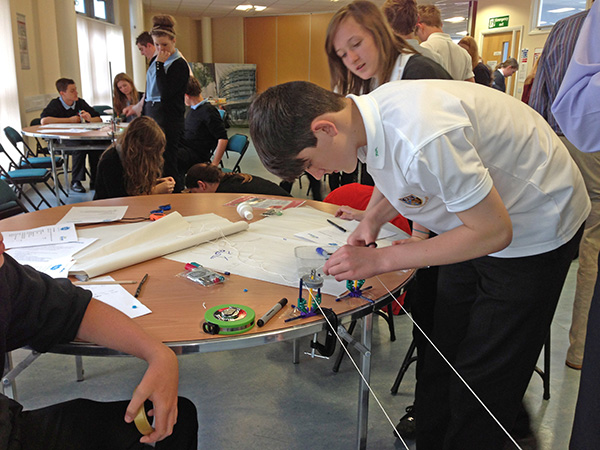 The problem is getting to market involves a long, dangerous walk down the mountain side and over a river, at the end of which the tomatoes may well be a bit squashed. Pupils are asked to design, build and test a way of moving tomatoes that won't squash them!
The problem is getting to market involves a long, dangerous walk down the mountain side and over a river, at the end of which the tomatoes may well be a bit squashed. Pupils are asked to design, build and test a way of moving tomatoes that won't squash them!
Suitable for pupils aged 7-11.
This activity is accredited by the British Science Association and can be used to gain a CREST Discovery Award.
Stop the Spread
 Stop the Spread is a STEM Challenge designed by Practical Action. The challenge asks pupils aged 7-11 to research infectious diseases then design and build a model of a hand washing device for a primary school in Kenya. Infectious diseases are a global problem and cause millions of deaths each year.
Stop the Spread is a STEM Challenge designed by Practical Action. The challenge asks pupils aged 7-11 to research infectious diseases then design and build a model of a hand washing device for a primary school in Kenya. Infectious diseases are a global problem and cause millions of deaths each year.
This activity is accredited by the British Science Association and can be used to gain a CREST Discovery Award.
Chemistry in the Primary Classroom
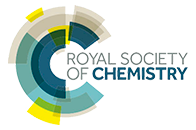 See Science have developed a new Chemistry at Work Primary workshop, funded by the Royal Society of Chemistry.
See Science have developed a new Chemistry at Work Primary workshop, funded by the Royal Society of Chemistry.
The upper KS2 workshop consists of 4 practical activities that pupils undertake in groups, each linked to a real-world Chemist's role. The activities include pH testing and identifying unknown white powders while the real-world Chemistry covered during the session ranges from Environmental Chemistry to Forensics and even polymer manufacture.
All 4 activities have proved popular with both pupils and teachers but by far the favourite amongst the children was making their own slime!
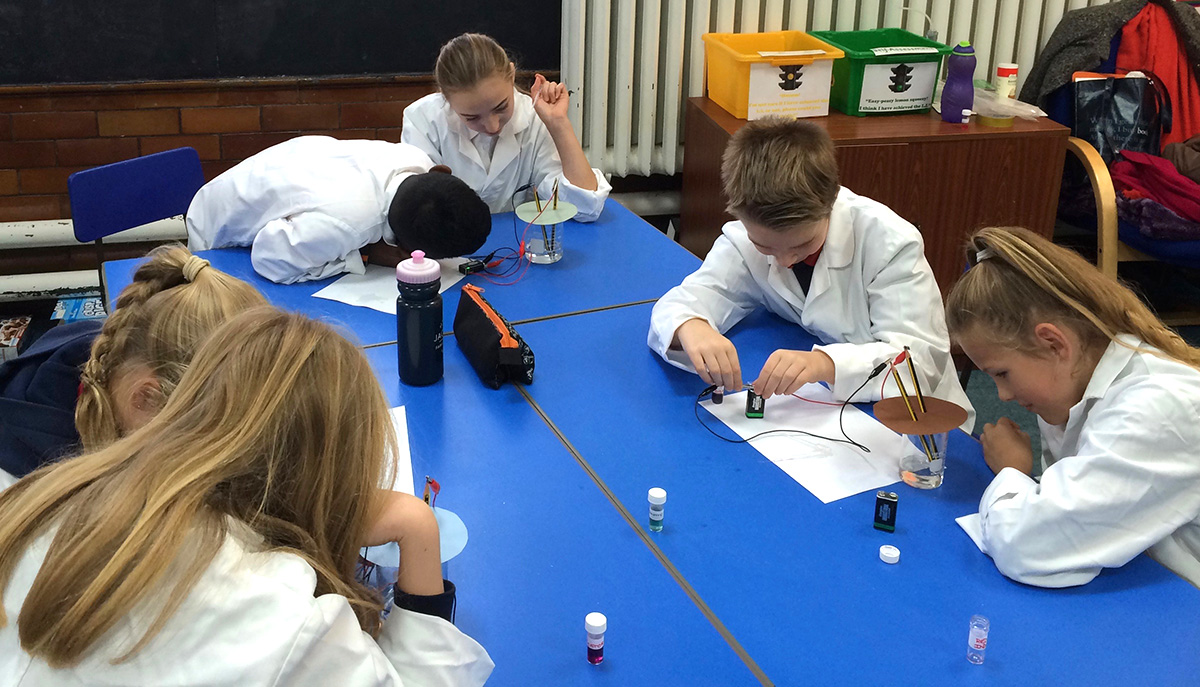 Feedback from teachers included:
Feedback from teachers included:
- "A great variety of activities that all pupils enjoyed taking part in."
- "We have done dissolving in class previously and it was good to hear the pupils using the terminology they had learned then while working on this real-world investigation."
- "The workshop kept every single pupil engaged throughout the two hours. Thank you!"
While pupils wrote:
- "My favourite bit was the slime but it was interesting seeing which white powders dissolved in water and then in vinegar."
- "Seeing the pH paper change colour was awesome!"
Milk and More
 Milk and More is a workshop which introduces biochemical science for KS2/3 audiences. It has been developed by See Science and funded through the Biochemical Society Scientific Outreach Grant.
Milk and More is a workshop which introduces biochemical science for KS2/3 audiences. It has been developed by See Science and funded through the Biochemical Society Scientific Outreach Grant.
The workshop comprises four different hands-on milk based activities, as well as some ideas of other food-related experiments. All are suitable for use within lesson time or as STEM Club activities.
The Physics of Flight
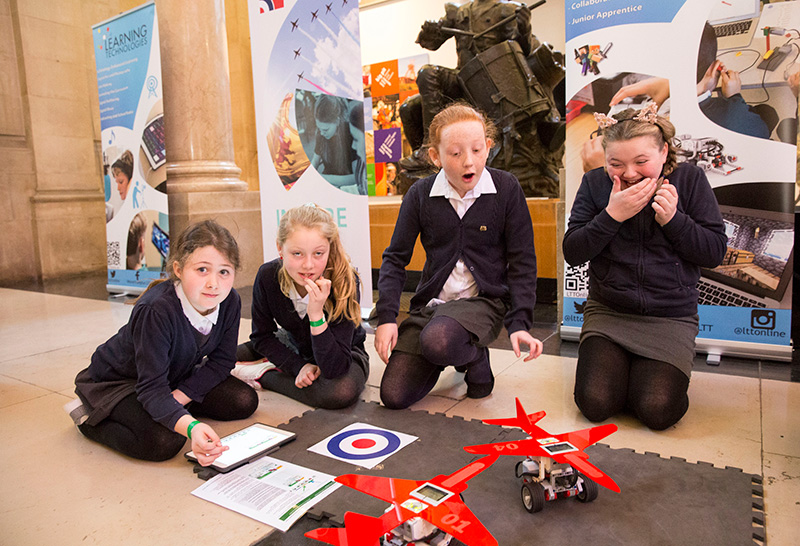 This lively hands-on workshop is based on resources from the RAF 100 activities which examines the physics behind flying – explore topics examining the last 100 years of flight which include. Make a glider, codebreakers, relief operations and airdrops. Suitable for pupils from 7-11yrs old.
This lively hands-on workshop is based on resources from the RAF 100 activities which examines the physics behind flying – explore topics examining the last 100 years of flight which include. Make a glider, codebreakers, relief operations and airdrops. Suitable for pupils from 7-11yrs old.
STEM in a BAG
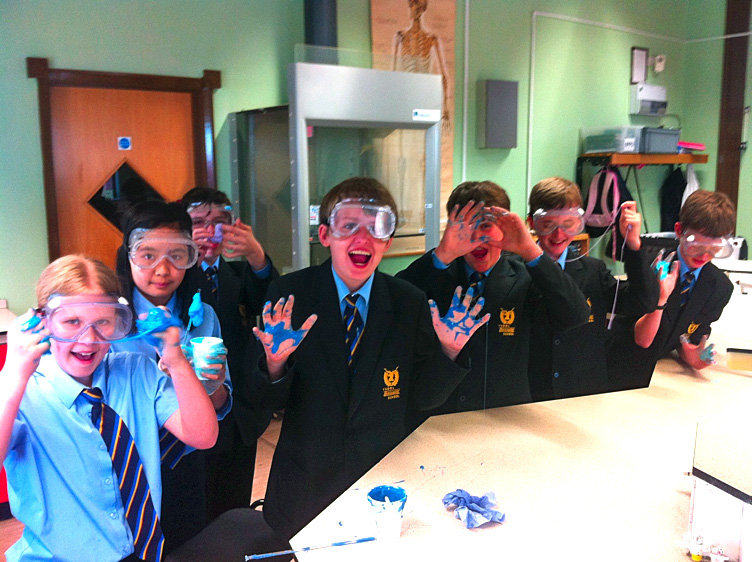 Try your hand a 10 different short activities using simple materials and examine the science behind them from straw oboes to loud noises – solutions to slime – let your imagination run wild. A hands on, imaginative workshop with plenty to do and talk about.
Try your hand a 10 different short activities using simple materials and examine the science behind them from straw oboes to loud noises – solutions to slime – let your imagination run wild. A hands on, imaginative workshop with plenty to do and talk about.
